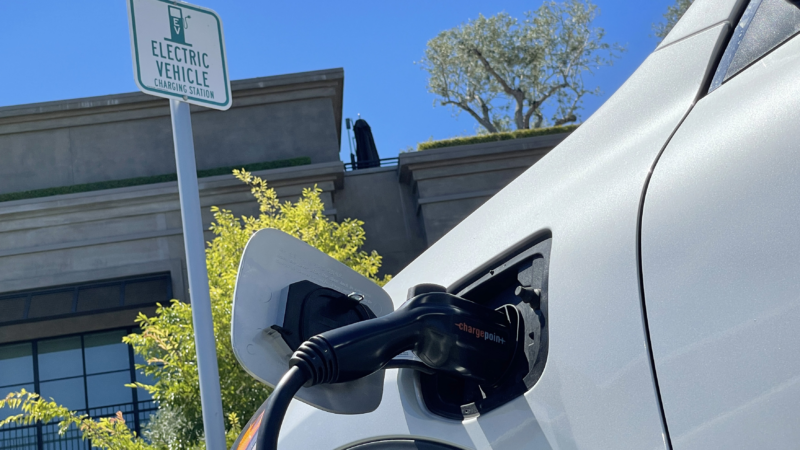Trump administration pauses $3 billion marked for electric vehicle charging stations
The Trump administration has paused a federal clean energy program to expand the country’s network of electric vehicle charging stations, putting in limbo billions of dollars allocated to states with current and future projects for the foreseeable future.
In a memo released Thursday, the Federal Highway Administration (FHWA) informed state transportation directors that the National Electric Vehicle Infrastructure (NEVI) program will be under review. The agency said existing contracts will be honored — suggesting some ongoing projects will still receive funding — but that “no new obligations may occur under the NEVI Formula Program” effective immediately.
That holds back about $3 billion that states expected to receive for future construction projects, according to the research firm Atlas Public Policy.
The FHWA said the the NEVI program will be updated to “align with current U.S. DOT policy and priorities,” referring to the Department of Transportation. A draft of the program’s amended policies will be published for public comment in the spring before a final version is issued.
“But that doesn’t mean that the the program is going to be sunset or the funds are not going to be made available again to the states,” said Nick Nigro, the founder of Atlas Public Policy.
The program was established by Congress in the Biden-era bipartisan infrastructure law, the Infrastructure Investment and Jobs Act, in 2021. Several experts tell NPR that as a result of its overwhelming bipartisan support at the time, attempts to overturn it within the executive branch are likely to be challenged in court. Nigro believes the funding will resume eventually.
The program was part of the Biden administration’s ambitious plan to improve access to charging stations, which are a major reason many drivers hesitate to switch to EVs, according to data from J.D. Power.
The goal was to build a network of highways with EV charging stations every 50 miles and accelerate the country’s transition away from gas- and diesel-powered vehicles, which are major contributors to climate change.
The NEVI program, which launched in 2021, was far from perfect, according to Ryan McKinnon, a spokesperson from Charge Ahead Partnership, a coalition dedicated to creating a nationwide EV charging network.
McKinnon said the program faced challenges like unfair competition from electric utilities and poorly designed grants, which resulted in broken or unattended EV chargers in some areas. But it also stimulated investment in charging stations, especially in fast chargers at popular gas stations and truck stops.
“While it is clear that NEVI didn’t solve the industry’s challenges, the program was a step in the right direction,” McKinnon said in a statement.
So far, 56 stations are up and running as a result of the program, while more than 900 sites in total have been “awarded” to date, according to Loren McDonald, chief analyst at Paren, another research analytics firm.
McDonald said several hundred of the awarded sites are currently under construction and expected to open this year. He does not believe the FHWA has the authority to pause or rescind any aspect of the NEVI program.
“The Trump administration is clearly trying to stop or pause programs like NEVI for as long as they can, but I assume lawsuits from states will start soon, and this will go to court and Congress,” McDonald said in a statement.
The FHWA order did not come as a complete surprise. During his campaign, President Trump repeatedly promised to cut EV requirements and incentives — often describing to the Biden administration’s clean energy policies as an EV “mandate,” though no such federal policy requires all vehicles to be electric.
For the Trump administration, the focus is to boost domestic production of fossil fuels. On Inauguration Day, Trump declared a “national energy emergency” invoking the National Emergencies Act to to increase drilling for oil in the country.
“We will drill, baby, drill,” Trump said during his inauguration speech last month. “We will be a rich nation again and it is the liquid gold under our feet that will help us do it.”
Among the recipients of the NEVI program is Tesla, which is led by Elon Musk, who is also a key adviser to Trump. Tesla has received about $31 million in awards, according to a database which tracks the program using data from the Joint Office of Energy and Transportation.
NPR’s Camila Domonoske contributed reporting.
Taiwan’s president pledges to defend island’s sovereignty after Chinese military drills
Taiwanese President Lai Ching-te vowed to defend the self-ruled island's sovereignty in the face of what he termed China's "expansionist ambitions," days after Beijing wrapped up live-fire military drills near its shores.
Deaths reported during widening protests in Iran sparked by ailing economy
The protests began due to economic pressures, with Iran's currency rapidly depreciating. Demonstrators have also chanted against the country's theocracy.
Congress failed to extend Obamacare subsidies. This Democrat says Trump can save them
Sen. Peter Welch, D-Vt., says he thinks the Senate can pass a "retroactive" Affordable Care Act subsidy extension, but "we need President Trump."
Rideshare union rights, social media limits and other state laws taking effect Jan. 1
Every new year, public media reporters across the country bring us some of the new state laws taking effect where they are. Here are six in 2026.
Guides to help you tackle your New Year’s resolutions
From building your strength to tackling credit card debt, NPR's Life Kit has a newsletter journey to help you tackle your New Year's resolution.
Guides to help you tackle your New Year’s resolutions
From building your strength to tackling credit card debt, NPR's Life Kit has a newsletter journey to help you tackle your New Year's resolution.






